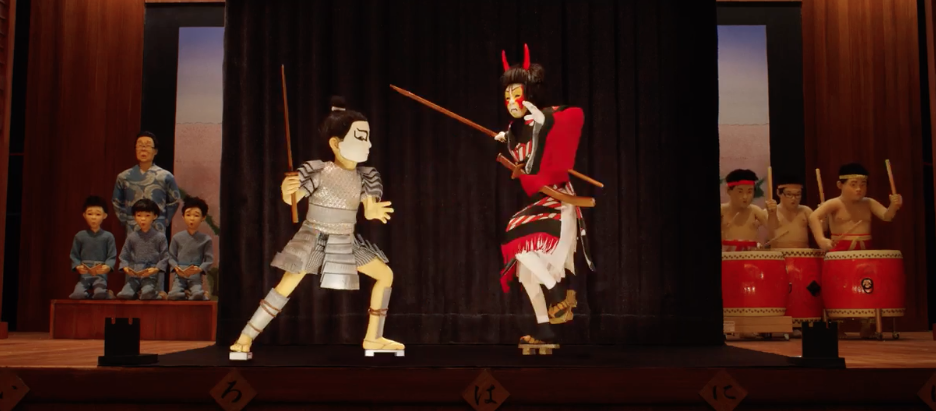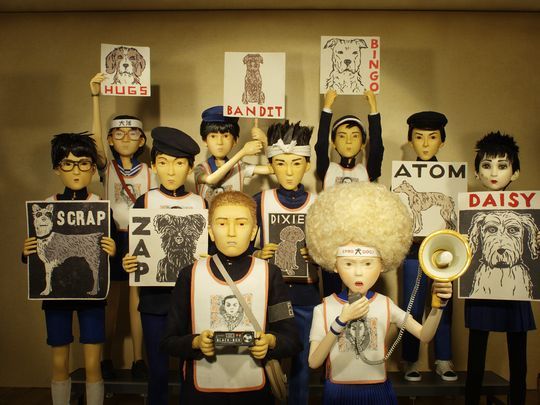Isle of Dogs and Japanese culture: Riff, love letter, or appropriation?
 Monday, April 2, 2018 at 11:42AM
Monday, April 2, 2018 at 11:42AM by Lynn Lee

A friend on Facebook recently asked me, after I posted a positive response to Isle of Dogs, what I thought about the controversy over Wes Anderson’s alleged cultural appropriation of Japan. My initial answer was that it bothered me a little bit, but not enough to mar my enjoyment of the movie. Later I realized that I’d just implicitly accepted the charge that there was cultural appropriation and, as an Asian American, felt mildly guilty that it didn’t bother me. But on further reflection, I’m not sure either of those knee-jerk reactions was warranted. It’s more complicated than that.
The question of cultural appropriation can be broken down a few different ways...
Does the movie treat Japanese culture respectfully or exoticize it as the “Other”?

These are two distinct, though interrelated, questions. While I’m not Japanese, I would say generally “yes” to the first, if only because the film pays such painstaking visual homage to Japan’s cultural heritage. The production designers modeled its aesthetic from both 1960s Japanese graphic design and Ukiyo-e woodblock prints, while the narrative owes a clear debt of influence to such filmmakers as Miyazaki and Kurosawa. Anderson himself has said that the film is a “reimagining of Japan through my experience of Japanese cinema.” And it’s quite a beautiful one, as even many of the critics have acknowledged.
All well and good, but in trafficking, however playfully, in stereotypes of Japan – cherry blossoms, sumo wrestlers, haikus, sushi chefs, and the like – does the film reinforce the Western sense of Japan, and Asia more generally, as exotic, “oriental,” even a little weird and absurd? Perhaps a little, but I seriously doubt this fantasy version of Japan is likely to mold anyone’s impressions of the real Japan or Japanese people. Anyone adult, that is; parents who want to take their kids to Isle of Dogs might want to provide a supplementary educational disclaimer.
I will say that it does make a big difference that the film—unlike, say, The Darjeeling Express, which also drew criticism for its cultural insensitivities—is animated, and therefore that extra degree removed from any pretense to verisimilitude. This also reflects my broader feelings about Wes Anderson—namely, that he’s at his best when working in animation, and stop-motion animation in particular. His brand of whimsy and exacting, almost fetishistic design translate much more smoothly to an already quaint and highly stylized medium than it does to “live action,” where the result can feel overly precious, artificial, even airless.

Homage or no, should Wes Anderson be (sorry) cherry picking and/or borrowing so heavily from a culture that isn’t his own?
This is a harder one. It’s a fine line between homage and appropriation, and dancing between the two is endemic to filmmaking and art in general. I don’t think even the harshest critics of Wes Anderson are advocating that white artists be prohibited wholesale from coopting imagery or cultural references from non-white cultures. (Or maybe they are, but I don’t subscribe to that view.) But then the only alternative norm would seem to be for the white artist to consult closely with those who do have a valid claim to that cultural legacy and treat that legacy with sensitivity and respect. For the most part, it seems to me that Anderson did that, or tried to. Others may disagree.
Is the movie, despite its foreign backdrop, centered on white characters?
With one exception, no, unless you read the dogs as “white” because they’re voiced in English. (I don’t.) The exception is the character of Tracy Walker (voiced by Greta Gerwig), a young blond American exchange student who foments resistance to Mayor Kobayashi’s campaign to isolate and eventually eliminate dogs from his town. The optics of a white outsider rallying the demoralized non-white opposition against their evil leader are admittedly cringeworthy. Again, though, I see Tracy less as a white colonialist figure than as a clunky attempt by Wes Anderson to improve his track record with female characters, who mainly tend to be pedestaled objects of male pursuit. Alas, he’s not very successful on this front, either. Tracy at first glance has more agency than most women in Wes Anderson movies, but she still ultimately registers as yet another manic pixie dream girl whose main function is to throw the heroism of the main male (human) protagonist into sharper relief. And of course, there’s no particular reason she needed to be white. Maybe the idea was to create a love interest who would be a complete outsider, but there were other ways of accomplishing that.

Readers, what did you think of Isle of Dogs’ use of Japan and Japanese culture? Did you find it delightful or did it leave a bad taste in your mouth?
 Greta Gerwig,
Greta Gerwig,  Isle of Dogs,
Isle of Dogs,  Japan,
Japan,  Wes Anderson,
Wes Anderson,  animated films,
animated films,  comedy,
comedy,  dogs,
dogs,  politics
politics 


Reader Comments (11)
thank you for this. As someone who grew up during the age of 'The Great Appropriator' (aka Madonna)... and then watched sampling culture and Tarantino and all those other things about taking art from elsewhere and making it your own explode... I didn't use to think of appropriation as a bad thing (unless it's all borrowed glory without a POV) but people are very upset about it lately.
I'm eager to see this again because it was so visually inventive and funny and to take all of these arguments into mind.
If you'll allow me an opportunity to complain about a pet peeve of mine. This film still hasn't opened in wide release. Most readers may not be able to share what they think about this good piece, as this film, a hugely hyped production by a significant American director, still isn't available to most viewers.
And since the cultural conversation has moved on to Ready Player One, among other things (I appreciate this site attempting to keep it up, even if we still can't participate), my motivation to see this in the theater on the big screen, and not just wait for streaming at this point is significantly diminished.
robert A -- i believe it goes wide next weekend. And if Grand Budapest Hotel is indication it will have a long run.
but yeah we don't endorse only talking about any movie before people can see it and never again like the rest of the internet.
I think having a foreign exchange student being a major protagonist was mostly to get an English voice among the humans, and as an excuse to have some of the Japanese characters speaking English within the film's convention of having the Japanese cast speaking Japanese without subtitles (which I liked). Whether Tracy Walker as a character "worked", I'm not sure. I did think while I was watching it "Oh, no, a white leader!" Maybe having two high school girls, one an exchange student and one her host family sister as co-leaders might have worked better, both to get in some English and to exemplify strong, interesting female characters.
Robert A - I hear you on this, as someone who has to wait for expansions *even with* local press accreditation. But at the same time, a talented writer like Lynn shouldn't be asked to put a pause button on her insights because a film hasn't gone wide. I think that would do a disservice to her readers that have already seen the film and ones who can loop back to her piece after they have.
Aw, thanks, Chris!
But yeah, it is a little disconcerting to me how quickly the cultural conversation (at least online or on social media) can move on from one movie to another, leaving behind large numbers of people who haven't even had a chance to watch the movie yet. It's one of the reasons I think TV has a long-term advantage/staying power over movies, although I am very much a proponent of seeing movies in theaters.
I think one of the most egregious and perplexing things about the film is the language divide between the dogs and the Japanese characters, which creates an unnecessary dichotomy that has the effect of othering the Japanese. This film was obviously made for an English-speaking market, and Anderson could have easily avoided (some of) the cultural pitfalls by having the entire film in English.
Tracy is certainly the most problematic element of the script, and I wish Anderson had erased her or at least made her a Japanese student instead. She's too much of a device, and the way she just irrupts into the film with such gusto while further peripheralizing the Japanese leaves a sour taste, especially when she's shoving her inexplicably comprehensive research into Yoko Ono's face.
I have fewer issues with the aesthetic appropriation, because it reads as scrupulous and affectionate homage even as it uses cultural signifiers for typically whimsical Andersonian flourish. Although it must be noted that the 1960s Japanese graphic design you mention it emulates was already heavily Western-influenced. "Isle of Dogs" is really just another in a long line of 20th-century popular culture that tacitly figures the vexed politics of globalization ("Blade Runner" anyone?).
Fuck these SJWs. Just watch the damn movie, honey.
Jonathan - good points, although I didn't mind the device of having the dogs speak English and not understand the Japanese-speaking humans. What I did mind was Tracy breaking that divide the way she did, and in the intrusive way you note.
This article is a nuanced and thoughtful exploration of the larger issue of how to treat Asian culture and Asianness, even though I don't agree with all of it.
I havent seen it yet and wont pay a full theatre price for it. I love Wes Anderson. But he knows good and damn well that his movie’s are incredibly white, and for him to just dip into another culture and use it for his own devices irritates the hell out of me. Classic colonizing cultural apprpriating attitude. From what Ive heard it seems he needs to check his priveledge. But I wont judge him at all til I can rent it on Google Play. I just know that if it was an insensitive film I wouldnt at all be surprised. Wes is a genius regardless.
Kris -- there are a lot of different viewpoints about this. I wouldn't be that outraged without seeing it. Here's a really interesting viewpoint from a Japanese man who seems to really love the movie and I, personally, got a lot of new info / perspective from this article. People are so quick to outrage these days. I guess that's easier than grappling with all the nuances in any given piece of art.